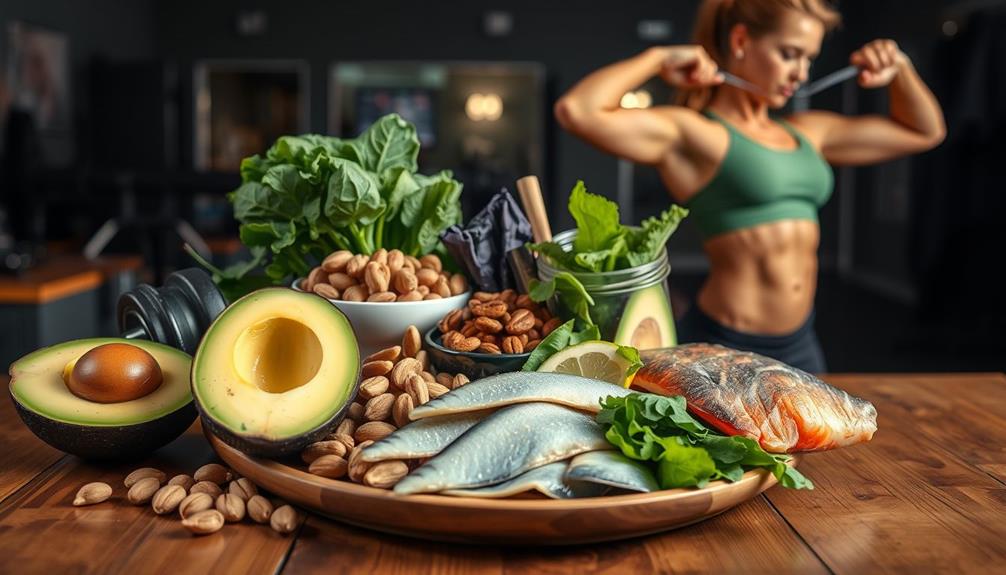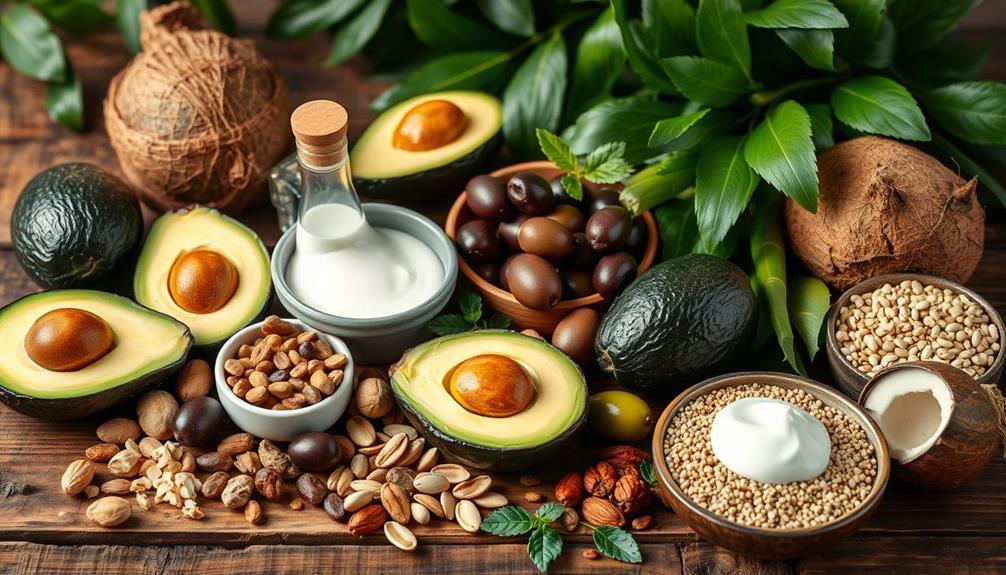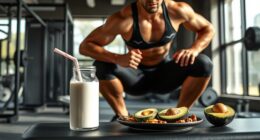Keto fuel is essential for athletes aiming to enhance performance by shifting energy usage from carbs to fats. By adhering to a high-fat, low-carb diet, you can enter a state of ketosis, which provides stable energy reserves and improves endurance. To succeed, focus on adequate protein intake, prioritize healthy fats like avocados and olive oil, and stay hydrated with electrolyte-rich fluids. Meal planning is key; plan nutrient-dense foods and snacks to prevent any deficiencies. As you explore this approach, you'll uncover more strategies to maximize your athletic potential on a keto diet. To maintain optimal performance, it’s important to regularly assess your nutrition and ketosis levels and make adjustments as needed. Monitoring your body’s response to the keto diet, as well as your energy levels and endurance, will help you fine-tune your approach and achieve consistent results. Consulting with a nutritionist or dietitian who specializes in ketogenic diets can also provide personalized guidance for optimizing your athletic performance. By incorporating thoughtful adjustments and staying mindful of your nutrition and ketosis, you can continue to elevate your athletic performance on a keto fuel regimen.
Key Takeaways
- Prioritize healthy fats and adequate protein to support energy needs and muscle maintenance on a keto diet.
- Monitor hydration and electrolyte intake to combat potential deficiencies and maintain performance levels.
- Time meals strategically around workouts, emphasizing high-fat meals before and protein intake after exercise for optimal recovery.
- Track macronutrient ratios consistently to ensure adherence to keto guidelines and promote effective fat oxidation.
- Incorporate nutrient-dense snacks like nuts and cheese to sustain energy during training sessions and prevent hunger.
Overview of the Keto Diet
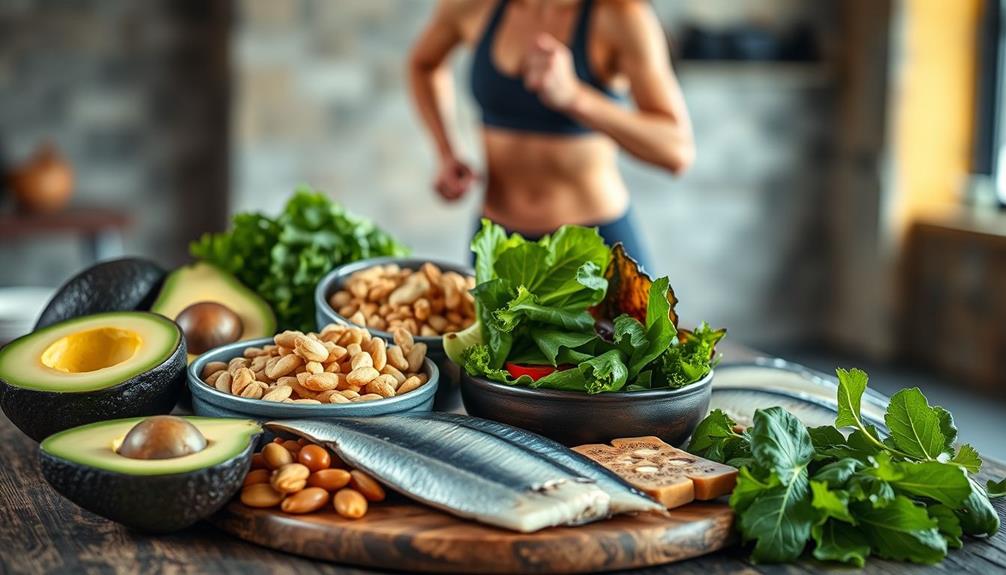
The ketogenic diet, often referred to as keto, transforms how your body fuels itself by drastically reducing carbohydrates and increasing fat intake.
This shift encourages your body to enter a metabolic state known as ketosis, where it relies on fats and ketones for energy rather than glucose. As your body adapts, you might experience an adjustment period, sometimes called "keto flu," where symptoms like fatigue and irritability occur.
However, once acclimated, you'll likely notice benefits such as improved fat oxidation, weight loss, and enhanced metabolic flexibility. These changes can lead to better body composition and, for athletes, even improved performance.
Embracing this diet means adopting a mindset focused on high-fat, low-carb meals that support your energy needs effectively.
Key Nutritional Requirements
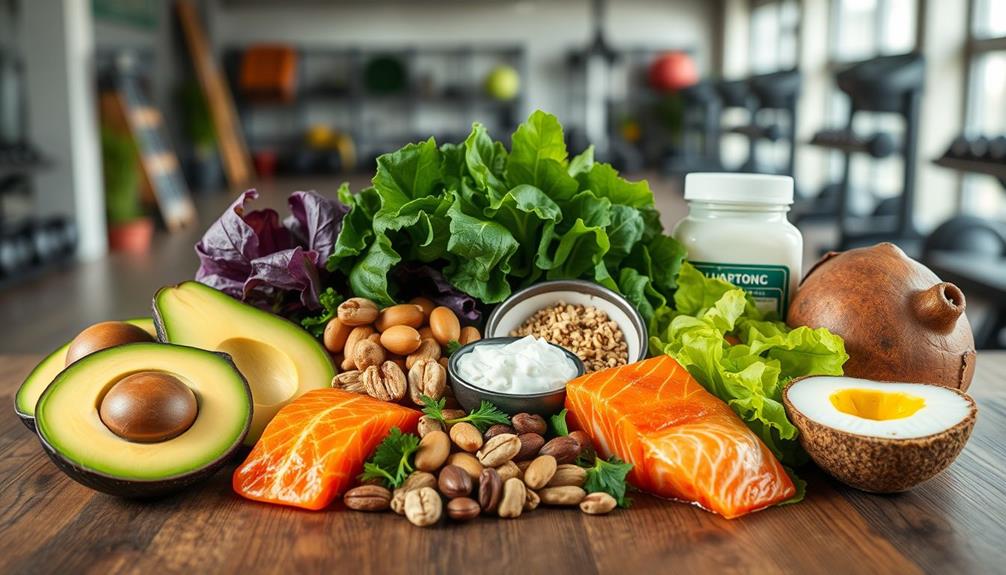
When aiming for success on a keto diet, understanding your key nutritional requirements is crucial.
Focus on adequate protein intake to support muscle growth and repair; aim for at least 1.2 to 2.0 grams of protein per kilogram of body weight.
Prioritize healthy fats, such as avocados, nuts, and olive oil, to fuel your body and maintain ketosis.
Keep track of your total calorie intake to guarantee you meet your energy demands without creating excessive deficits.
Don't forget about hydration—drink plenty of water and consider electrolyte supplements, especially sodium, potassium, and magnesium, to prevent fatigue.
Finally, plan your meals and snacks to avoid impulse purchases that might compromise your keto progress.
Staying organized is key!
Impact on Athletic Performance
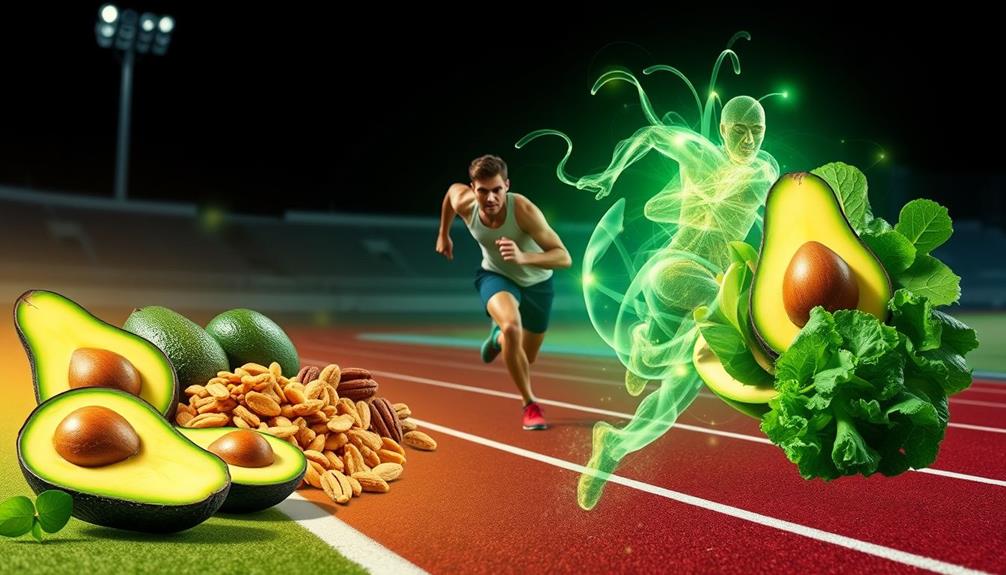
Adopting a keto diet can greatly enhance your athletic performance by optimizing the way your body utilizes energy.
By shifting your energy source from carbohydrates to fats, you tap into a more stable fuel reserve, which can lead to improved endurance during long training sessions or competitions. This enhanced fat oxidation allows you to maintain energy levels without the spikes and crashes associated with carb-heavy diets.
Additionally, many athletes report greater mental clarity and focus, essential for peak performance. You'll likely experience faster fat loss and improved body composition, contributing to a stronger physique.
Potential Risks for Athletes

Steering through the potential risks of a keto diet is essential for athletes aiming for peak performance.
You might experience nutrient deficiencies due to the diet's restrictive nature, which can lead to decreased energy levels and hinder your overall performance. Insufficient protein intake can cause muscle loss, while excessive caloric deficits may also impact your strength.
Additionally, you could face symptoms like "keto flu" or gastrointestinal distress, disrupting your training routine. Maintaining ketosis is critical, as fluctuations can affect your performance.
It's important to monitor your macronutrient ratios, hydration, and electrolyte balance consistently. By being aware of these risks, you can make informed choices and mitigate potential setbacks on your athletic journey.
Effective Meal Planning Tips
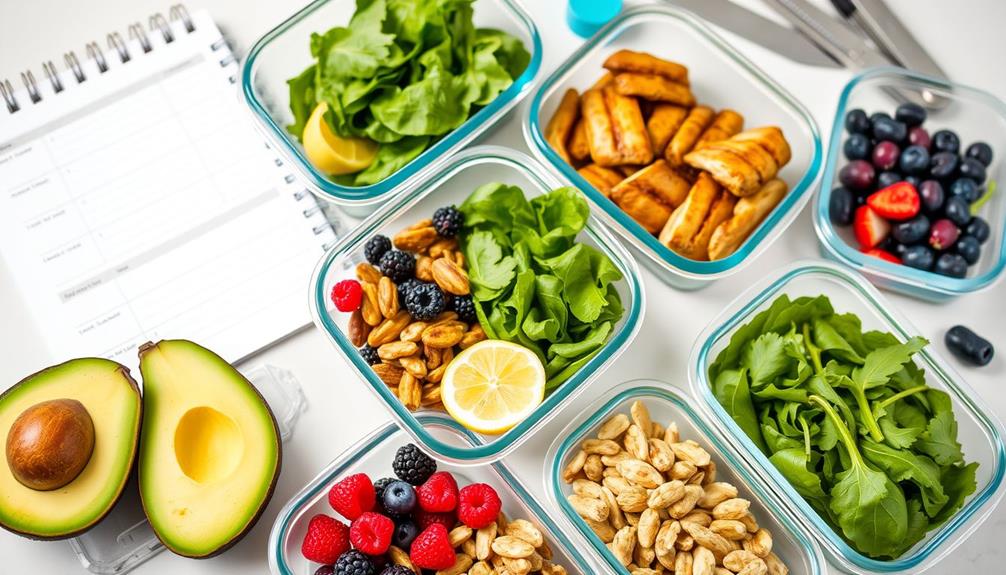
Effective meal planning is essential for athletes following a keto diet to guarantee they meet their nutritional needs while maintaining ketosis.
Start by creating a weekly meal plan that emphasizes high-quality fats, adequate protein, and low-carb vegetables. Keep a detailed shopping list to avoid impulse buys that could throw you off track.
Batch cooking can save time; prepare meals in advance to ensure you always have keto-friendly options ready. Don't forget to track your macronutrient intake to stay within your carb limits.
Incorporate snacks, like nuts or cheese, to curb hunger and maintain energy levels during training.
Maintaining Nutritional Balance
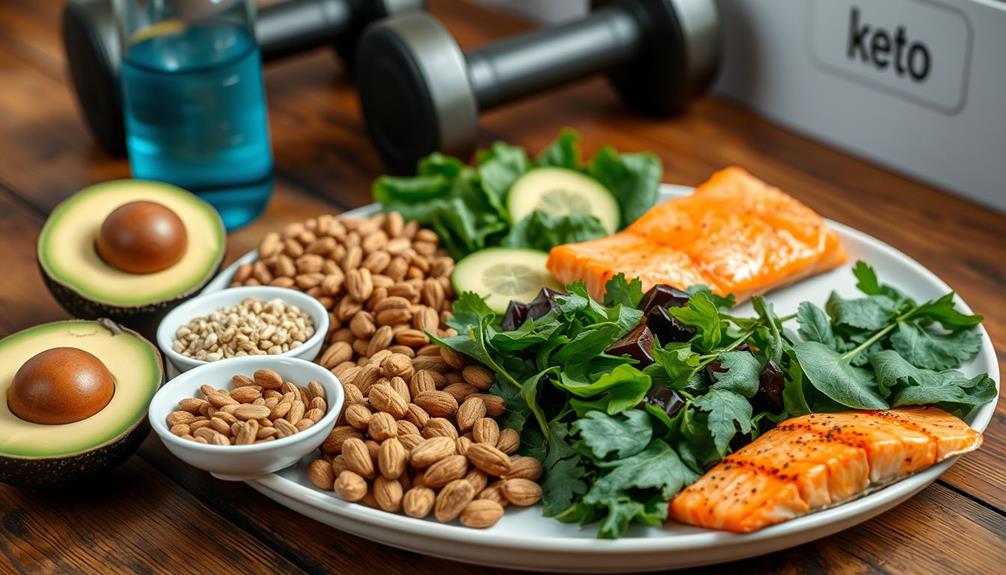
How can you guarantee that your nutritional balance remains intact while following a keto diet as an athlete?
It's essential to focus on a variety of nutrient-dense foods to prevent deficiencies. Here are some key strategies to keep in mind:
- Incorporate a mix of healthy fats, like avocados, nuts, and olive oil.
- Prioritize protein sources such as grass-fed meats, fish, and eggs for muscle maintenance.
- Stay hydrated and monitor your electrolyte intake, especially sodium, potassium, and magnesium.
- Regularly assess your macronutrient ratios to verify you're staying within keto guidelines.
Strategies for Optimal Fueling
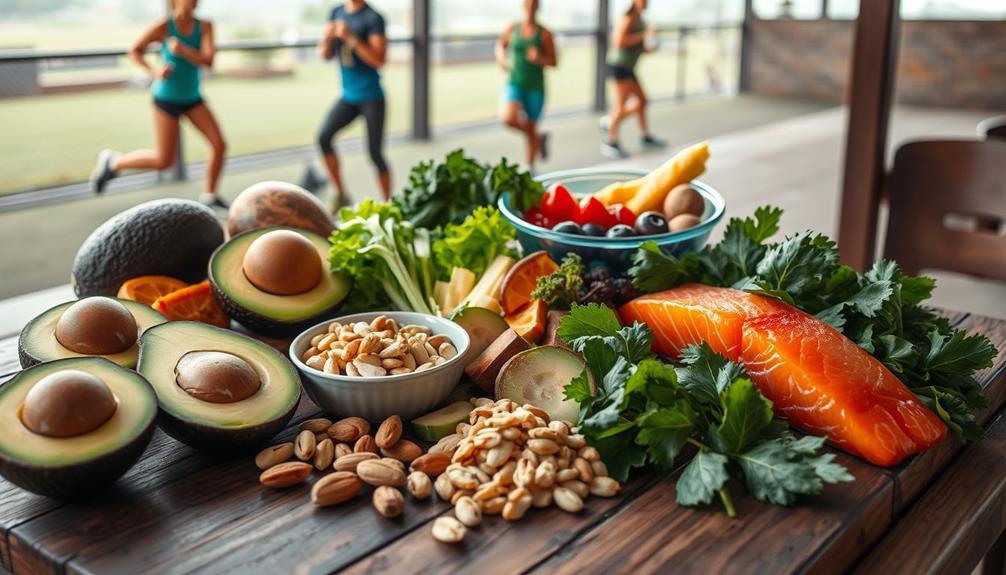
Maintaining your nutritional balance is just the beginning; optimizing your fueling strategy is key to enhancing performance on a keto diet.
Focus on timing your meals around training sessions. Consume a high-fat meal 2-3 hours before workouts to guarantee energy availability.
Post-workout, prioritize protein intake to aid muscle recovery while keeping carbs minimal. Incorporate nutrient-dense snacks like nuts or cheese between meals to sustain energy levels.
Hydration's vital, so drink plenty of water and consider electrolyte supplements to replace lost minerals.
Regularly track your macronutrient intake to make certain you're meeting your goals.
Frequently Asked Questions
Can I Combine Keto With Other Diets or Eating Plans?
Yes, you can combine keto with other diets! Just guarantee you maintain the low-carb focus while integrating elements from those plans. Monitor your macronutrients carefully to achieve your goals without disrupting ketosis.
How Does the Keto Diet Affect Hydration Levels?
The keto diet can impact hydration levels considerably. As your body shifts to ketosis, it excretes more water and electrolytes. You've gotta stay mindful of your fluid intake to avoid dehydration and maintain performance.
What Are the Best Snacks for Keto Athletes?
Wondering what to snack on while staying in ketosis? You'll love options like nuts, cheese, and avocado. They're tasty, pack healthy fats, and keep your energy steady, fueling your workouts without breaking your diet.
Are There Specific Supplements Recommended for Keto Athletes?
For keto athletes, consider supplements like magnesium, potassium, and omega-3 fatty acids. They help balance electrolytes, reduce inflammation, and support overall performance. Always consult a nutritionist to tailor your supplementation to your specific needs.
How Long Does It Take to Adapt to a Keto Diet?
It usually takes you about two to four weeks to fully adapt to a keto diet. During this time, your body shifts from using carbohydrates for energy to burning fats, which can cause temporary discomfort.
Conclusion
As you commence on this keto journey, think of yourself as a racehorse, shedding the weight of excess carbs and galloping towards your performance goals. With every meal, you're fueling your engine with high-quality fats, sharpening your focus, and enhancing endurance. Just as a skilled jockey knows their steed, you'll learn to navigate the twists and turns of keto nutrition. Embrace this transformation, and let the ketogenic diet propel you to new heights in your athletic pursuits.
